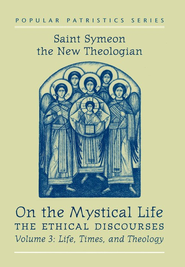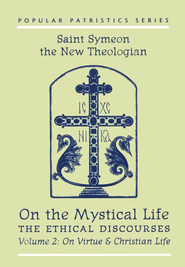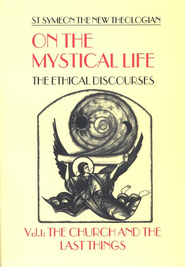St. Symeon the New Theologian, On the Mystical Life: The Ethical Discourses
St. Symeon the New Theologian, On the Mystical Life: The Ethical Discourses


 Vol. 1 The Church and the Last Things (Crestwood: St. Vladimir’s Seminary Press, 1995)
Vol. 1 The Church and the Last Things (Crestwood: St. Vladimir’s Seminary Press, 1995)
Vol. 2 On Virtue and Christian Life (Crestwood: St. Vladimir’s Seminary Press, 1996)
Vol. 3 Life, Times and Theology (Crestwood: St. Vladimir’s Seminary Press, 1997)
I first heard of Symeon the New Theologian from one of my professors in seminary, Steven J. Land. Dr. Land defended a dissertation on Pentecostal Spirituality, which has now become a standard text for students of Pentecostal theology. One of the prime examples of proto-Pentecostal mysticism used in the text is Symeon the New Theologian, a 10th century mystic. Since my first encounter in seminary, I have desired to examine Symeon’s writings in person and being Slavic in background I have been partially able to do so because some are available through the Eastern Orthodox tradition. Therefore, I was thrilled when St. Vladimir’s Seminary published the trilogy in English. The point I would like get across is that if you are a Pentecostal scholar, reading Symeon’s writings is a must.
Do not be scared by the word mystical. Reading Symeon, one quickly finds out that the Pentecostalism experienced in any given holiness church is much more drastic, than any mystical example Symeon may have had.
Symeon’s writings do not fit a concrete type of literature. They explain theology in laymen’s terms, while taking the reader to the depth of the most intense theological discussions of the ages. Much like a Pentecostal testimony, the words have a way of bringing the experience of God close to the heart, while at the same time exalting His glory to the highest of all.
Therefore, a true Pentecostal commentary of the trilogy must begin with Symeon’s testimony of his experience. It is hardly an enigma to recognize that Symeon speaks about the same experience, which we Pentecostals testify of – the experience of the Holy Spirit. He describes the event as “seeing the light” that is felt emotionally and physically and which transforms the soul with its divine power.
The first volume, entitled The Church and the Last Thing, begins with the Genesis stories of the Creation, Adam and Eve in the Garden, the first sin and God’s pan for salvation. For the Western reader, this approach resembles Augustine’s De Civitate Dei. For the Eastern Pentecostal reader it is similar to the sermons we were accustomed to under the Communist Regime, where the pastor would begin a message with Genesis and finish with Revelation. And for any Pentecostal, Symeon’s approach reveals God’s plan for man and His divine provision through the ages in the ultimate goal of history beginning with the first creation and finishing with the already-not-yet eschatological reality.
Eschatology for Symeon is not just the last things, but the first things now made perfect by God. It is both near and immanent, much like the Pentecostal expectation of the Lord’s return. It includes Israel, the Heavens and the Judgment Day. Interestingly, Symeon brings in the experience of a personal new beginning based on a free human will. He sees the end as closely connected to the personal choice for eternity. The terms “foreordained” and “called” are examined in the saying “Those Whom He Foreknew, the Same He Also Predestined.” The claim that some are elected and others rejected is refused by Symeon with the simple, but strong words: “Did he ever say to some: ‘Do not repent for I will not accept you?’ … Of course not!”
The second volume, dedicated to the life of the Christian believer, comes as close to a Pentecostal experience as can be imagined. Symeon is quick to point out his own experience with God identifying it with the words of the apostle, “He appeared also to me” (1 Corinthians 15:8).
He speaks of the conscious possession of the Holy Spirit, claiming that one cannot “have” the Spirit and not know about it. For Symeon, the knowledge of the Spirit is the experience of the Sprit accompanied with feelings and emotions. For “only the dead feel nothing,” but when you possess the Spirit you know because you can feel. How close is this terminology to the Pentecostal, “I’ve got the Holy Ghost” and “I feel it. I feel it?” To the skeptic, Symeon further declares: “Do not say that it is impossible to receive the Spirit of God. … On the contrary, it is entirely possible when one desires it.”
Symeon continues with the statement, that the believer is “called to see God in this life.” The conscious possession of the Holy Spirit is not only a personal experience with God, it is a present eschatological foreseeing and a prophetic anticipation of what is yet to come. According to Symeon, “Hearsay is not enough. The saints describe what they have seen” (emphasis mine); therefore, “through the Holy Spirit the saints become eyewitnesses of the world to come.”
In the last volume, Symeon speaks of the Christian sacraments clearly differentiating between the sacramental and personal experience of God. His theological overview articulates the incarnation, but refuses to explain the Trinity with human terms. Instead, Symeon calls the Church to “participate in the life of the Trinity,” again juxtaposing theological reasoning against personal experience of God. This particular practice is accompanied with an interesting note from the author about church politics. In a typical mystical manner, Symeon urges the believer to follow the mandate of the Spirit rather than the mandate of the Church.
The trilogy presents the New Theologian as new in name, but old in religion and original in the personal experience of God. This fact proves that through the ages, there have always been people searching for God with an open heart and experiencing His presence in a Pentecostal manner. It further defines the Pentecostal experience of the Spirit as the true restoration of the Early Church praxis. And finally, it proves Land’s thesis that Pentecostalism is more Orthodox than Catholic and more Eastern than Western.
When I became Pentecostal, I did not know this would become the “new fad” of 21st century spirituality. What I knew was that I experienced God personally and He personally saved my soul. Symeon’s testimony is not much different and can be summed up in one statement: one can make the reality of heaven the reality of this life by having a real experience with God.
Reviewed by Dony K. Donev
Category: Church History, Fall 2006, Pneuma Review


